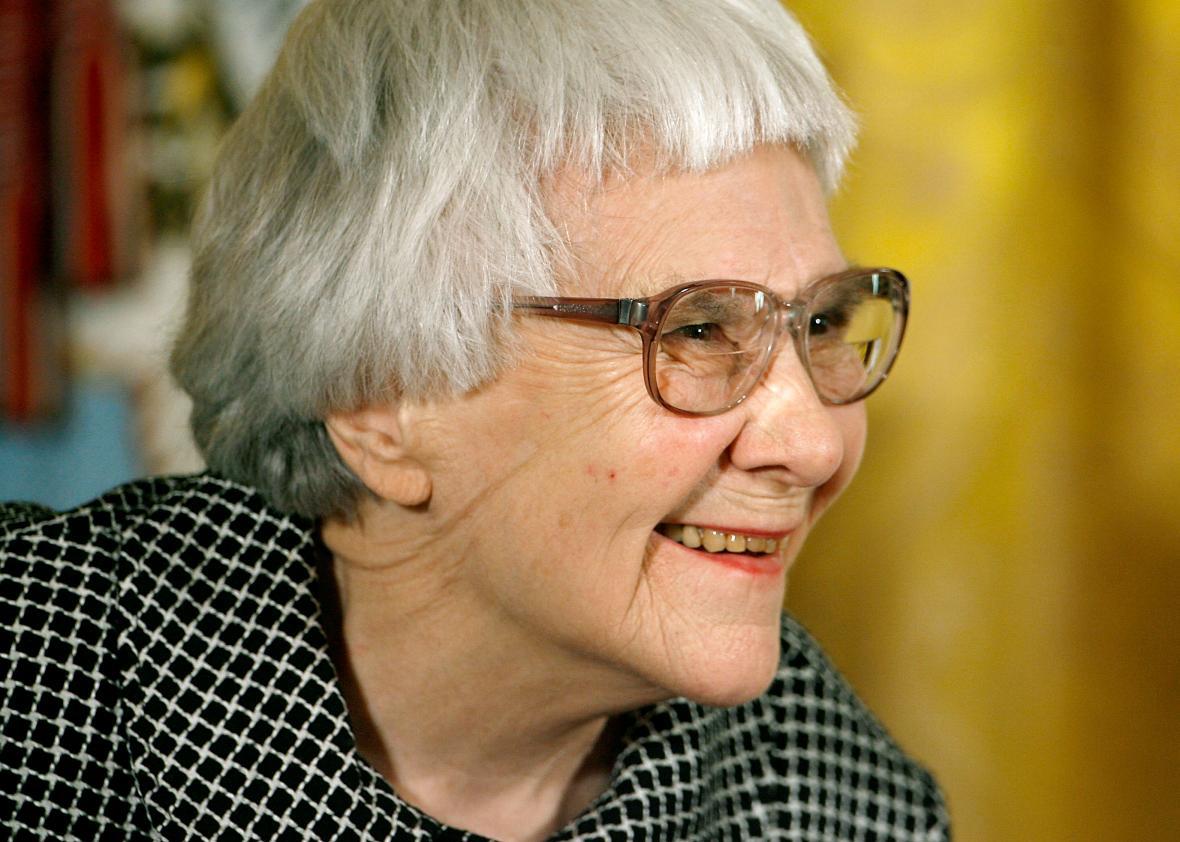Harper Lee’s hotly (if warily) anticipated new novel Go Set a Watchman will come out on Tuesday, July 14. Today the Guardian published an excerpt: the first chapter, in which a twentysomething Jean Louise Finch—To Kill a Mockingbird readers may know her as Scout—returns from New York to Maycomb, Alabama, the sleepy county where she grew up. In addition to the text, the Guardian has supplied 23 minutes of audio narration by Reese Witherspoon. Here are our preliminary impressions of Lee’s sequel (though she reportedly wrote it before To Kill a Mockingbird and then let it languish in a drawer).
First, Lee’s gifts at summoning a regional atmosphere are on full display. She paints a vivid picture of the landscape, the black cows and the yellow trickle of the Chattahoochee River, the “tin-roofed houses set in the middle of swept yards,” encircled by “inevitable verbena,” the deep pine forests and pastureland. Many of Lee’s details cast a mocking but affectionate glow on Southern life, too, where ties are stubbornly local and traditions unspoken but dependable. Of course the conductor will “forget” to stop the train at Maycomb Junction, overshooting the platform by a quarter mile, to tease the young woman passenger who has just reminded him to let her off. Likewise, Lee takes care to puncture the romance surrounding Maycomb County’s namesake, Colonel Maycomb, a folk hero whose firm conviction that American Indians hate fighting on flat terrain led him to spend most of the Creek Indian wars poking around hilly thickets to the north. (The enemy was wreaking havoc in the south). By the time he figured out his error, the conflict was over, so he founded a town in his own honor.
Presumably, Jean Louise learned the unedited history of Colonel Maycomb from her father, Atticus Finch, now in his 70s and suffering (as stoically as you’d imagine) from rheumatoid arthritis. In his daughter’s flashbacks Atticus is the same gimlet-eyed but gentle critic of his community as always. Jean Louise anticipates from the train that he will be waiting “not six steps away from her point of debarkation,” wise, like her, to the pranks of mischievous conductors. And she remembers the “profane glint” in his eye—or was it just light reflecting from his spectacles?—as he corrected the record on her much-mythologized cousin Joshua, a brilliant poet whose deranged designs on the life of his college president led the authorities to shut him up in a mental institution. (“They said he was reasonable in every respect until someone mentioned that president’s name, then his face would become distorted, he would assume a whooping crane attitude and hold it for eight hours or more, and nothing or nobody could make him lower his leg until he forgot about that man,” Lee writes with typical flair.)
The first part of the excerpt is soaked in nostalgia and re-acclimation, with Jean Louise’s homecoming mirrored imperfectly in our own as the gentle engines of the prose speed us back to Maycomb. (Lee’s wondrous feel for the way kids think comes through in observations like “For no reason an ancient fear gnawed her. She had not been in this station for twenty years, but when she was a child and went to the capital with Atticus, she was terrified lest the swaying train plunge down the riverbank and drown them all.”)
Then, there’s a seam. Sufficiently re-immersed in the familiar setting, Jean Louise—plus readers—arrive at the beginning of Go Set a Watchman’s plot. Atticus is not waiting for his daughter at the station. Instead, she’s met by her neighbor and lover Henry Clinton, a World War II veteran with an enigmatic scar and old-fashioned dreams of marrying, supporting, and domesticating his girlfriend. As for that girlfriend, one of the delights of this excerpt lies in developing a distinct sense of the woman Scout has become. No longer “an overalled, fractious, gun-slinging creature” (and no longer speaking to us in the first person), she still “moved like a thirteen-year-old boy and abjured most feminine adornment,” was “easy to look at and easy to be with most of the time,” but was “in no sense of the word an easy person.” Rebellious and independent as ever, Jean Louise harbors “a restlessness of spirit [Henry] could only guess at.”
Jean Louise almost-but-not-quite loves Henry, and she doesn’t want to doom him to Maycomb’s signature brand of domestic dissatisfaction and infidelity. She provokes and then soothes him, wavering on how to field his increasingly ardent proposals. If To Kill a Mockingbird implicitly addressed feminism, Go Set a Watchman may bring its wash of promises, obligations, and uncertainties to the fore.
Aside from that, Lee briskly, heartbreakingly, informs us that Jem Finch, Scout’s brother, “dropped dead in his tracks one day.” Will we learn more about this tragedy as the novel continues? Will Boo Radley make an appearance? Will Lee’s new book be half as wise and devastating as her old one in its handling of race? All I can say from this excerpt is that Lee’s delicious mode of understated deflation—an undermining bent redeemed and warmed up by a sense of humor—is such a pleasure to encounter again. Next chapter, please!
